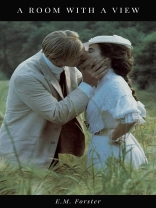This Edwardian social comedy explores love and prim propriety among an eccentric cast of characters assembled in an Italian pensione and in a corner of Surrey, England.
A charming young Englishwoman, Lucy Honeychurch, faints into the arms of a fellow Britisher when she witnesses a murder in a Florentine piazza. Attracted to this man, George Emerson, who is entirely unsuitable and whose father just may be a Socialist, Lucy is soon at war with the snobbery of her class and her own conflicting desires. Back in England, she is courted by a more acceptable, if stifling, suitor and soon realizes she must make a startling decision that will decide the course of her future: she is forced to choose between convention and passion.
O autorze
Edward Morgan Forster OM CH was an English author, best known for his novels, particularly A Room with a View (1908), Howards End (1910), and A Passage to India (1924). He also wrote numerous short stories, essays, speeches and broadcasts, as well a limited number of biographies and some pageant plays. He also co-authored the opera Billy Budd (1951). Today, he is considered one of the most successful of the Edwardian era English novelists.
Born into a comfortable middle-class family, Forster was an only child. His father died before he reached the age of two, and thereafter he was raised by his mother and a variety of other female relatives. After attending Tonbridge School he studied history and classics at King’s College, Cambridge, where he met fellow future writers such as Lytton Strachey and Leonard Woolf. He then travelled throughout Europe before publishing his first novel, Where Angels Fear to Tread in 1905.
Many of his novels examine class difference and hypocrisy. He was nominated for the Nobel Prize in Literature in 20 separate years.












